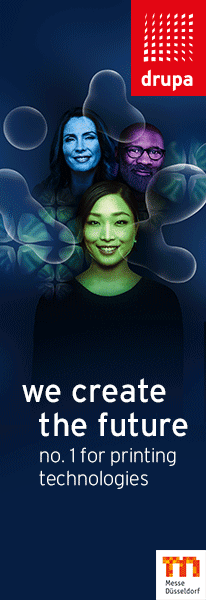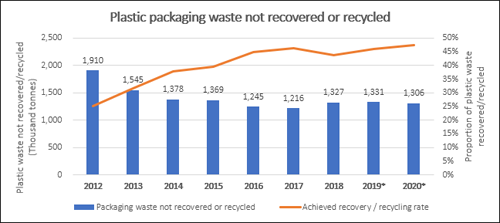Analysis of DEFRA statistics on plastic packaging waste reveals that while rates of recovery and recycling are improving, the total volumes of plastic packaging that is not being recovered or recycled is not being reduced.
The analysis from Nozama (and developer of PLastiks) found that 1.3m tonnes of plastic packaging were neither recycled or recovered in the UK in 2020, the latest figures available.
While this marks a small decrease from the previous two years, it is an increase from 2016 and 2017 when 1.245m and 1.216m tonnes of plastic packaging failed to be recovered or recycled, respectively. The total volumes are at odds with the improved recovery/recycling rate of plastic packaging which reached a record high of 47.4% in 2020, although some additional estimates put this far lower.
The statistics show a need for a renewed focus on eliminating single use plastic waste according to André Vanyi Robin, Founder and CEO of Nozama, who said, “It is evident from these figures that while improvements are being made in the recovery and recycling of plastic packaging, we are not keeping up with the use of single use packaging. It is crucial that waste management players are given every encouragement possible to ensure they are doing their utmost to track, recover and recycle single use plastic.”
Robin said that the growing problem of single use plastic waste was behind the launch of Plastiks in early 2022, as the world’s first utility NFT dedicated to fighting the scourge of global plastic contamination. “Plastiks is a blockchain-powered bridge between plastic recyclers and producers in the ongoing fight to protect the environment to incentivise a much-needed increase in the amount of plastic recovered for recycling. The Plastiks marketplace enables global recyclers to turn invoice data into NFTs. Each NFT created uses data recorded on the blockchain to certify that a corresponding amount of plastic has been recovered, thus ensuring it doesn’t end up in the environment. Plastic producers, users, and recyclers, as well as NFT collectors, can then buy and sell these NFTs.”
Fernanda Accorsi, Head of Marketing & Communications, Nozama, adds: “These transactions create an additional revenue stream for waste management companies from plastic that’s already been recovered. It empowers and incentivises every player in the Reverse Logistic Supply Chain so that we can reach higher recycling rates and achieve greater transparency in the sector. On the other side, plastic producers and users are provided with an opportunity to make a meaningful investment in the recovery of single-use plastic, ensuring that this plastic does not end up in the environment.”




